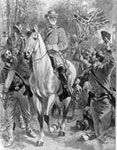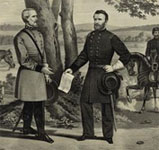
Loyalty




Lincoln offered Lee command of the Union army. He declined, and his honor forced him to resign from the U.S. army. In his resignation letter, he promised to never again go to war except "in the defense of my native State," which for him was Virginia. Lee had reservations about secession, but his loyalty to his country obliged him to help lead the Confederate army.
Lee also showed loyalty and affection to his fellow commanders and his troops. After hearing of the death of , he said "I have lost my right arm. I am sick in the heart." During the retreat from Pickett's Charge at Gettysburg, Lee repeatedly told the few who survived that the defeat was entirely his fault.
Because of the strong loyalty Lee showed his men, he also received it back. His soldiers would endure anything for him.
On the battlefield, Lee showed remarkable daring and cunning. Lee's preferred style of battle was to attack. When McClellan was marching on the road to Richmond, Lee initiated the Seven Days Battle that forced the cautious Union leader to retreat, despite out-numbering Lee. At the Battle of Chancellorsville, Lee split his army in half and out-flanked the Union army. Even when forced into defensive tactics in 1864, Lee still probed and looked for opportunities to break out, forcing Grant to endure heavy casualties. His daring and cunning helped prolong the war against incredibly poor odds and provided real opportunities for victory.
Only once did Lee's instinct to attack truly fail him, at Gettysburg, but that one time may have cost the South the war.
Lee's finest hour as a general may have come not in war, but in peace. Jefferson Davis had given him explicit orders not to surrender under any condition. Lee could have disbanded his army and ordered a guerilla campaign of small attacks and raids that might have kept the killing going on for years. Instead, he accepted defeat gracefully and spent the rest of his life trying to rebuild the relationship between the North and South. After the war, he served as President of Washington University (now Washington & Lee University), where he explicitly tried to recruit Northern students. Lee's handling of his surrender showed how grace in defeat can help make everyone better in the long run.